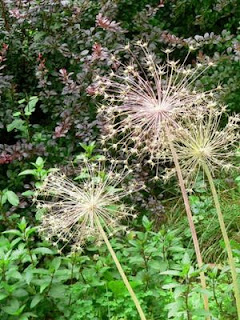Since Mr. Splashy Pants erased this review her first night here, I'll start over discussing
Three Cups of Tea.
"She was very beautiful," he said as they lay looking at a Milky Way that was so
dense it covered them like a shawl. "Her face was small, like Jahan's, and she
was always popping up an laughing, like a marmot."
So Pakistani Balti man Twaha describes his first wife on page 120 of
Greg Mortenson and
David Oliver Relin's extraordinary
Three Cups of Tea. The book, describing how a failed attempt on K2 led to the
Central Asia Institute and its attempts to build schools in Pakistan and Afghanistan, is not about marmots, or rodents of any kind. However, like Nick Hornsby's discussion of
sugar mice in Fever Pitch, this line spoke to me. It takes a certain amount of experience with marmots to understand what a great compliment it is, but anyone reading can grasp its sweetness.

I've spent a fair amount of time in the last month trying to figure out what makes this book great. My father hurried and finished it while he was here in May so that he could leave the book with me (my mother had already read and recommended it). The Mister picked it up the day after I finished it and read the first half in one sitting. The Mister's father read it over two days while he was here. The Mister's father was particularly interested in the descriptions of Pakistan. He had been there in the 1980s and found the portrayal of the landscape and the people consistent with his experience. None of the rest of us have any experience in the area. None of us know enough about the climbing community to know anybody whose name was dropped* except Sir Edmund Hillary. The book is not a "feel good" book. The plot, as it were, involves lots of bureaucratic and logistic frustrations, which generally don't make for a page turner. Yet somehow it is a great book.
I credit author David Oliver Relin for the book's greatness. Greg Mortenson, the book's subject, has done fantastic stuff, but writing a biographical call-to-action that doesn't end up beatifying the subject, preaching, or just becoming boring, takes great literary talent. Relin works wonders with Mortenson's story without making a reader notice the writing at all. A great feat.
Plot wise, I would have liked this book far more if it didn't need to bring up 9/11, the Taliban and the invasion of Afghanistan. This speaks more to my desire to wish away the last eight years of US history than any legitimate criticism of the book. Of course, I also know a book about building schools in Pakistan and Afghanistan would never have been written without the current terrorist angle. In any case, don't expect many marmots, but do read this book.
*I've come to realize that knowing names of food writers and a few gardeners can make you feel like an insider when reading
Calvin Trillin or Ruth Reichl and like an outsider when trying to read about climbing or Arsenal football or discuss anything with anyone other than my mother.
**More money goes to Central Asia Institute if you buy
Three Cups of Tea from the official website I've linked. I'll also happily pass around this well-read copy.

































